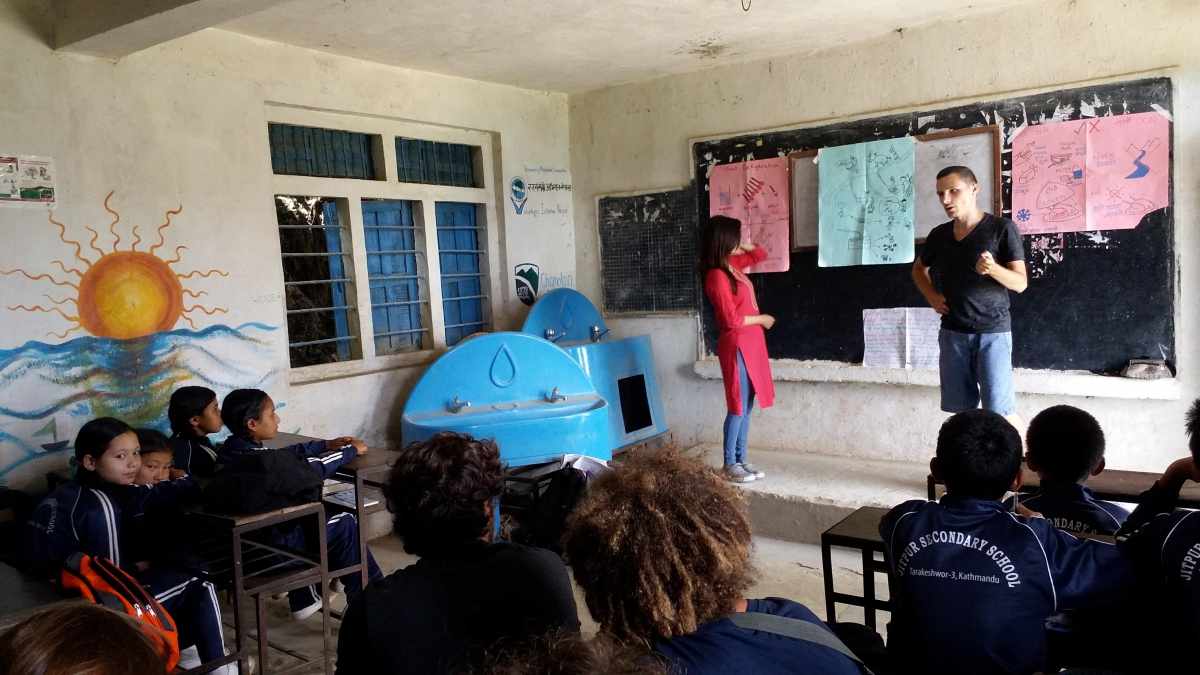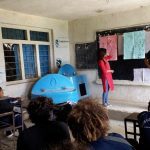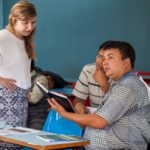
Many children in Nepal fail to attend school, drop out and do not complete their primary education or progress to secondary education. The schools within the communities are public, funded in part by the government and owned within the community. Whilst the government has committed to provide teachers in community schools on a ratio of 1:40, the situation is very different in sparsely populated rural areas. Often, there are not enough children attending school and, if the government doesn’t supply the teacher to the community, they must provide their own at their own expense. Such is the situation in Community Schools in Nepal.
As a result, most of the teachers are unqualified and untrained. They opt for traditional teaching and learning methods, namely parrot style or ‘rote-learning’. Rather than exploring subjects and the children’s understanding, frequent repetition is usually practiced for the purpose of passing exams. Because teachers often lack formal qualifications and training, children are affected by low quality education, impacting on their basic English language, mathematical, social and scientific skills which makes them less prepared for future employment and opportunities in their lives.
The major goal of the English in a Community School Project is to help the children of marginalized communities by ensuring they have a decent command over English language. At present, English Language has become a vital skill for the Nepali people. It gives them a voice and offers them a chance to positively impact their future. Hence, this project works with the school’s existing English teacher providing them assistance with teaching methods and language barriers.
We do not ask that our volunteers be native English speakers: rather, we request them to be flexible and with a positive attitude and willingness to learn. You will assist and lead English lessons to Nepali children aged between 6 to 16 years, with class sizes ranging from 10 to 50 children. Each period will be between 40 to 45 minutes and In Nepali schools, the teacher moves between classrooms whilst the children stay in the same classroom for each subject.
Nepali community schools can be unpredictable and it is not uncommon for them to be closed due to holidays, exams and other circumstances. At such times, volunteers will be asked to teach in the community, helping those who are financially unable to attend school. During your volunteer placement you will live in the community with a Nepali host family, offering you the chance to become immersed in Nepali culture and language. Depending upon you interest and expertise, you will be involved in one or more of the following activities:
- Teach free standing English lessons or teach English from the government text book of English Language;
- Those who can are invited to teach Mathematics and Science as well;
- Make teaching-learning process fun and engaging;
- Ensure maximum participation form the students;
- Teach children proper pronunciation and grammatical sentence constructions;
- Conduct recreational activities to foster learning such as word games;
- Assist the English teachers to develop their own language skills;
- You may work with students in other aspects of learning such as sports, art or music.
Project Specific Skills
- Excellent inter-personal communication skills
- Able to give clear instruction and direction
- Lateral and creative thinking
- Proficient in conducting classes
- Basic English language requirements
- Previous experience in teaching would be an added asset
Desirable/ Common Skills
- Excellent communicator with good interpersonal skills
- A team player with good workethics
- Time management and leadership qualities
- Adaptable, flexible and able to work under pressure
- Accepting of different ideas and culture
- Problem solving: always be part of solutions than part of a problem
- Creative
- Positive attitude
Requirements
- Gender: Female / Male
- Minimum Age: 18+ years (16-17 years old person can volunteer but need to present parents’/ guardian’s consent letter)
- Language:English (Intermediate)
- Educational:High School Graduate
Your Experience/ Setting
Upon your arrival at Kathmandu Tribhuvan International Airport (TIA), you will receive a warm welcome and be transported to your hotel or hostel. If you are already in Nepal before the start of your placement, we can make alternative arrangements for you. You will undergo a comprehensive two- to three-day induction program after arrival. This induction will provide valuable information about your project and general information about the Nepalese language, culture, health, safety, and security. It is also an excellent opportunity to connect with fellow volunteers and interns who can become your companions for sightseeing and a source of support throughout your volunteer placement.
During the induction period, you will be accommodated in a budget hotel or hostel arranged by VIN. However, most of the VIN experience involves living with a Nepalese host family. While this immersion is essential for a complete experience, we understand that it can be challenging as you adapt to a new culture and adjust to facilities that may be more basic than you are accustomed to. Don’t worry; all our host families have experience accommodating volunteers, although their English-speaking abilities may vary. Also, you will have 24-hour access to our staff members for support and assistance throughout your placement.
Volunteers will be assigned to one of VIN’s working areas, which include Tarakeshor Municipality in Kathmandu, Taluwa, Thulachhap, and Bhadaure in Okhaldhunga, and Okharpouwa and Kaule in the Nuwakot district. While at the working site, volunteers are requested to bring their lunch box, water bottle, safety gear, face mask, and any other essential belongings. We advise volunteers to dress comfortably and modestly, preferably with long sleeves. Please get in touch with us for guidance and support if you want to raise project funds or collect project-specific resources. This will help the community a lot.
Schedule and Commitment
You will work five to six days a week, up to six hours per day. You may propose your preferred time and hours; however, the working time period will be dependent on the institution you have been placed. A minimum of 2 weeks’ time commitment is expected of a volunteer. The longer you commit; the better impact you can make. You should be willing to commit a certain amount of your free time and energy, show a lot of commitment and be a good listener. You are expected to work constructively and co-operatively maintaining good reputation and standards at all times. Volunteer should abide by relevant security concerns and access procedures. Moreover, you should be receptive and positive to performance appraisal, advice and feedback. Throughout your placement, you will have the full support of VIN. Your safety is our highest priority.
Your typical day might look like this:
| 07:00-08:00 | Tea/Leisure Time |
| 08:00-09:00 | Breakfast/Brunch (Nepali meal – Daal-Bhaat) |
| 09:00-10:00 | Preparation for sessions |
| 10:00-13:00 | Conduct classes |
| 13:00-14:00 | Lunch (Packed lunch) |
| 15:00-17:00 | Conduct classes |
| 17:00-20:00 | Preparation for next day/Leisure time |
| 20:00-21:00 | Dinner (Nepali meal – Daal-Bhaat) |
You will receive a clear and concise on-the-job instructions, course of action, context of work and policies/strategies before your placement begins. You will be provided with ample of guidance and support throughout the placement with trainings / onboarding sessions incase necessary. You will be in a constant communication and regular check-in with the VIN volunteer coordinator. VIN aims to maintain a culture of continuous feedback between the volunteer supervisor at the placement to monitor the performance of the volunteer and ensure the project delivers desired outcomes.
In case of an emergency, you may contact one of our Volunteer Coordinators who will be available anytime for your assistance and support.
Click here to Learn more on how volunteering works
Mid and Long Term Volunteers:
2 weeks minimum stay- € 380
3 weeks – 480€
4 weeks – 580€ (after 4th week, for each additional week €95)
University Internships:
4 weeks minimum stay- € 680 (for each additional week – €105
Click here to Learn what’s included and excluded in our Fees Section
Click here to Learn recruitment process on how volunteering works
Our projects are open year-round, and our inductions begin on the first and third Mondays of each month. We would like to ask that volunteers arrive one day before the start of the induction. You can choose the duration of your participation based on your available time. However, so that you know, our volunteering placements are limited. We highly recommend booking your placement in advance to secure your placement. Click here to apply.



 Member of
Member of